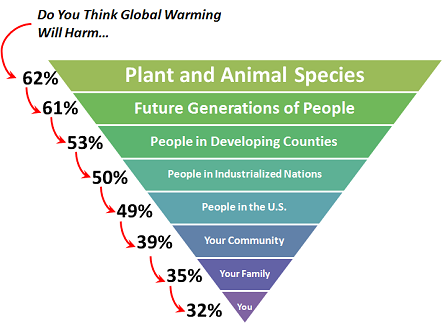A new study reminds us of the importance of how proposed climate disruption (aka climate change) and clean energy solutions are labeled, with the same solution gaining bi-partisan support worded as an "offset", but not if labeled a "tax".
Here's the news release from the Association for Psychological Science:
Columbia University psychological scientists David J. Hardisty, Eric J. Johnson, and Elke U. Weber wanted to see how the way in which a concept is framed (that is, how it is labeled) affects our attitude towards it. In this experiment, volunteers (who self-identified as Democrats, Republicans, or Independents) read about a program that would increase the cost of certain carbon-producing activities but would use the proceeds to fund alternative energies or carbon capture and sequestration. For half the volunteers this surcharge was labeled as a "carbon offset," while for the other half it was labeled as a "carbon tax," yet the details of the program were the same in each case. Participants then had to choose between two identical items (e.g., airline tickets), where one cost more, because it included the surcharge. Volunteers were asked to write down their thoughts about the decision, make a choice, and also indicate whether they would support legislation making the surcharge mandatory for all products of that type.This study provides yet another reminder of how opposition to climate change and clean energy solutions often doesn't make sense beyond framing and labeling issues.
The results, reported in Psychological Science, a journal of the Association for Psychological Science, suggest a strong link between our political affiliation and how we react to certain frames. In the “offset” condition, Democratic, Republican, and Independent volunteers tended to select the more expensive, albeit environmentally-friendly, product. They were also equally likely (across party) to support making the cost increase mandatory. However, in the “tax” condition, while Democratic volunteers still opted for the costlier item, Republican and Independent participants were more likely to choose the cheaper item, and did not support legislation.
Somewhat frighteningly, the study also suggests that the ability of humanity to avoid catastrophic impacts of climate disruption might just depend on the word choices of a few politicians.
Let's hope those shaping the public debate about the Senate's climate change and clean energy legislation are able to successfully integrate this type of lesson into their communication strategy.
Read more>>
...

No comments:
Post a Comment